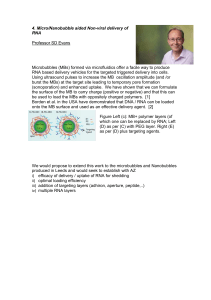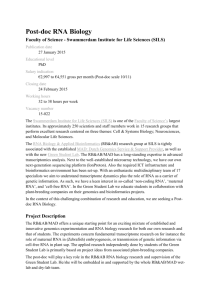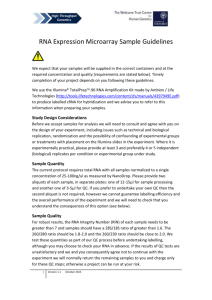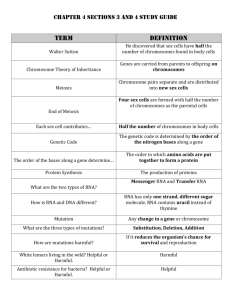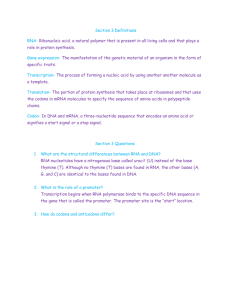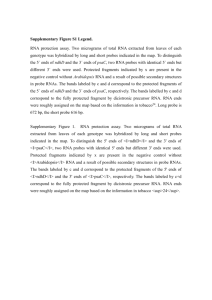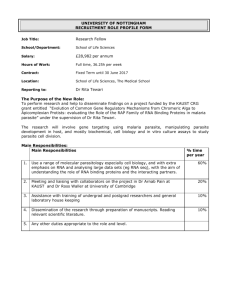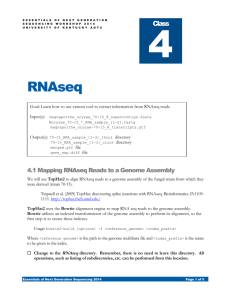Job Title - Jobs - University of Nottingham
advertisement
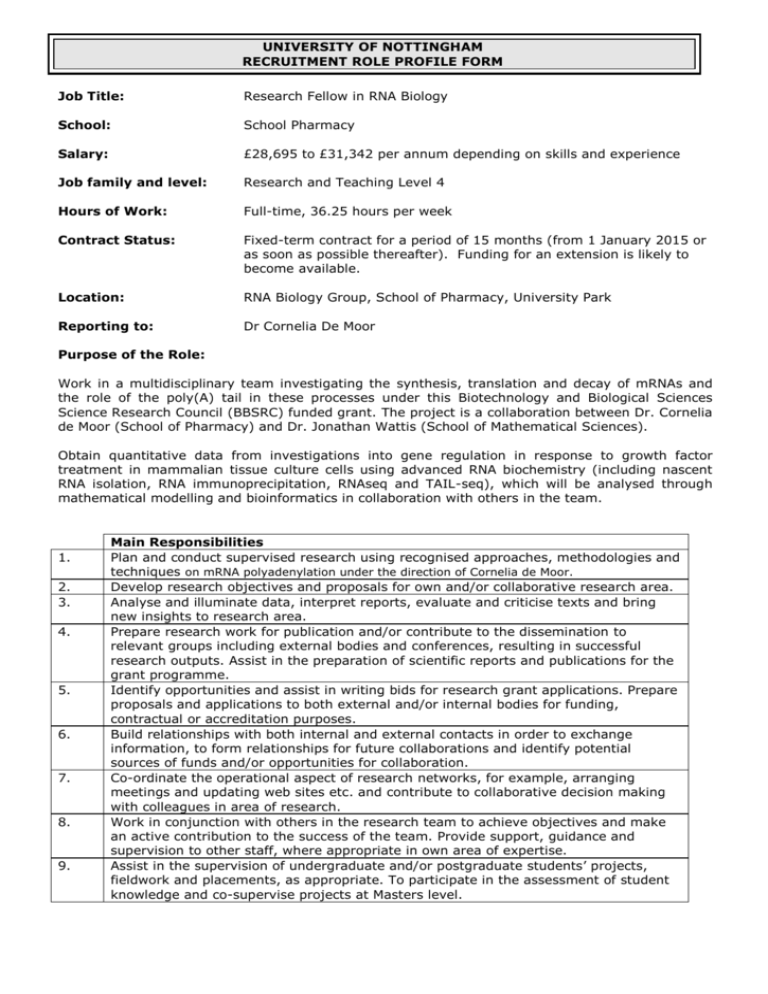
UNIVERSITY OF NOTTINGHAM RECRUITMENT ROLE PROFILE FORM Job Title: Research Fellow in RNA Biology School: School Pharmacy Salary: £28,695 to £31,342 per annum depending on skills and experience Job family and level: Research and Teaching Level 4 Hours of Work: Full-time, 36.25 hours per week Contract Status: Fixed-term contract for a period of 15 months (from 1 January 2015 or as soon as possible thereafter). Funding for an extension is likely to become available. Location: RNA Biology Group, School of Pharmacy, University Park Reporting to: Dr Cornelia De Moor Purpose of the Role: Work in a multidisciplinary team investigating the synthesis, translation and decay of mRNAs and the role of the poly(A) tail in these processes under this Biotechnology and Biological Sciences Science Research Council (BBSRC) funded grant. The project is a collaboration between Dr. Cornelia de Moor (School of Pharmacy) and Dr. Jonathan Wattis (School of Mathematical Sciences). Obtain quantitative data from investigations into gene regulation in response to growth factor treatment in mammalian tissue culture cells using advanced RNA biochemistry (including nascent RNA isolation, RNA immunoprecipitation, RNAseq and TAIL-seq), which will be analysed through mathematical modelling and bioinformatics in collaboration with others in the team. 1. 2. 3. 4. 5. 6. 7. 8. 9. Main Responsibilities Plan and conduct supervised research using recognised approaches, methodologies and techniques on mRNA polyadenylation under the direction of Cornelia de Moor. Develop research objectives and proposals for own and/or collaborative research area. Analyse and illuminate data, interpret reports, evaluate and criticise texts and bring new insights to research area. Prepare research work for publication and/or contribute to the dissemination to relevant groups including external bodies and conferences, resulting in successful research outputs. Assist in the preparation of scientific reports and publications for the grant programme. Identify opportunities and assist in writing bids for research grant applications. Prepare proposals and applications to both external and/or internal bodies for funding, contractual or accreditation purposes. Build relationships with both internal and external contacts in order to exchange information, to form relationships for future collaborations and identify potential sources of funds and/or opportunities for collaboration. Co-ordinate the operational aspect of research networks, for example, arranging meetings and updating web sites etc. and contribute to collaborative decision making with colleagues in area of research. Work in conjunction with others in the research team to achieve objectives and make an active contribution to the success of the team. Provide support, guidance and supervision to other staff, where appropriate in own area of expertise. Assist in the supervision of undergraduate and/or postgraduate students’ projects, fieldwork and placements, as appropriate. To participate in the assessment of student knowledge and co-supervise projects at Masters level. 10. 11. 12. 13. Collaborate with academic colleagues on areas of shared interest for example, course development, collaborative or joint research projects. Plan and manage own research activity and resolve problems, if required, in meeting own/team research objectives and deadlines in collaboration with others. Contribute to the organisation of research resources and facilities, laboratories and workshops as appropriate. Undertake general laboratory duties such as ordering of reagents, equipment maintenance, and laboratory housekeeping. Contribute to teaching, for example through laboratory demonstrations, lectures to postgraduate workshops and/or delivery of Level 1 modules. Person Specification: Qualifications/ Education Skills/Training Essential 1. A 1st or upper-second class honours degree and a PhD in a molecular biology subject. Desirable PhD which has RNA biology as a major element. 2. Ability to plan and conduct high quality experimental work in RNA biology. Bioinformatic skills. Advanced statistical skills. Experience with RNAseq. Experience with systems biology. Experience in mRNA decay research. 3. Good written and verbal communication skills. 4. Excellent oral and written communication skills including the ability to communicate complex information with clarity and write to a publishable standard. 5. Strong analytical skills including the ability to analyse and illuminate data, interprets reports, evaluate and criticise texts and bring new insights. 6. Ability to creatively apply relevant research approaches/models/ techniques/methods and devise and manage research programmes. 7. Excellent problem solving, IT and organisational skills including the effective deployment of resources. 8. Ability to build effective relationships as part of a team and collaborate with others, both internally and externally. 9. Flexible, proactive and dedicated approach. 10. Ability to travel within the UK and overseas. Experience 11. Previous experience of advanced RNA techniques such as polysome profiling, RNA affinity chromatography and RNA immunoprecipitation (other advanced RNA techniques may also qualify). Publications in the RNA biology field. Previous success in gaining support for externally funded research projects. Training and/or supervision of staff or students. 12. A proven track record of obtaining high quality data using molecular biological techniques. 13. Presenting work effectively to a variety of professional and academic audiences at meetings and conferences. 14. A consistent track record of published research in peer-reviewed journals and writing high quality reports and papers for publication. Due to the requirements of the UK Border and Immigration Agency, applicants who are not UK or EEA nationals and whose immigration status entitles them to work without restriction in the UK will be considered on an equal basis with UK and EEA nationals. Other non-UK or non-EEA nationals whose employment will require permission to work subject to a resident labour market test may only be considered if there are no suitable UK or EEA national candidates for the post. Please visit http://www.ukba.homeoffice.gov.uk/ for more information. Informal enquiries may be addressed to Dr Cornelia De Moor (email: cornelia.demoor@nottingham.ac.uk) or Dr Jonathan Wattis, email: Jonathan.Wattis@nottingham.ac.uk. Please note that applications sent directly to these email addresses will not be accepted. The University of Nottingham has a range of policies to promote equality and diversity in the workplace which are fully supported and promoted by the School through its Equality and Diversity Committee.
